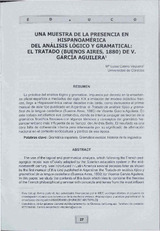Una muestra de la presencia en Hispanoamérica del análisis lógico y gramatical: El "Tratado" (Buenos Aires, 1880) de V. García Aguilera
Autor
Calero Vaquera, María Luisa
Editor
Universidad de Córdoba, Servicio de PublicacionesFecha
2008Materia
Gramática españolaGramática escolar
Historia de la lingüística
Spanish grammar
School grammar
History of the linguistics
METS:
Mostrar el registro METSPREMIS:
Mostrar el registro PREMISMetadatos
Mostrar el registro completo del ítemResumen
La práctica del análisis lógico y gramatical, impuesta por decreto en la enseñanza oficial española a mediados del siglo XIX a imitación del modelo didáctico francés, llega a Hispanoamérica varias décadas más tarde, como demuestra el primer manual de este tipo publicado en Argentina: el Tratado de análisis lójico y gramatical
de la lengua castellana (Buenos Aires, 1880) de Vicente García Aguilera. En este trabajo estudiamos sus contenidos, donde se intenta conjugar las teorías de la gramática filosófica francesa con algunos términos y conceptos del gramático hispanoamericano
más influyente de su tiempo: don Andrés Bello. El resultado es una
obra falta de coherencia interna pero Interesante por su significado de afirmación nacional en el contexto sociocultural y político de esa época The use of the logical and grammatical analysis, which following the French pedagogical model was officially adopted by the Spanish education system in the midnineteenth century, was introduced in Latin America severa! decades later as shown by the first manual of this kind published in Argentina: the Tratado de análisis lójico y
gramatical de la lengua castellana (Buenos Aires, 1880) by Vicente García Aguilera. In this paper, we study the contents of this book which tries to combine the theories of the French philosophical grammar with concepts and terms from the most influent. Latin American grammarian at that time, Andrés Bello. The result is a piece of work lacking in internal coherence but interesting from the sociocultural and political point of view because of its assertion of national identity at the time.

